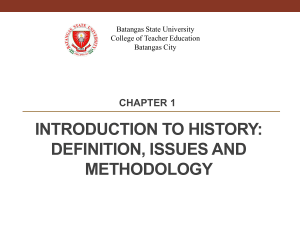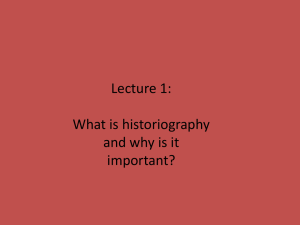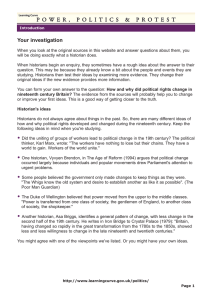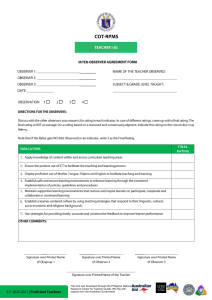Readings of Philippine History - Chapter 1 - Introduction to History
advertisement
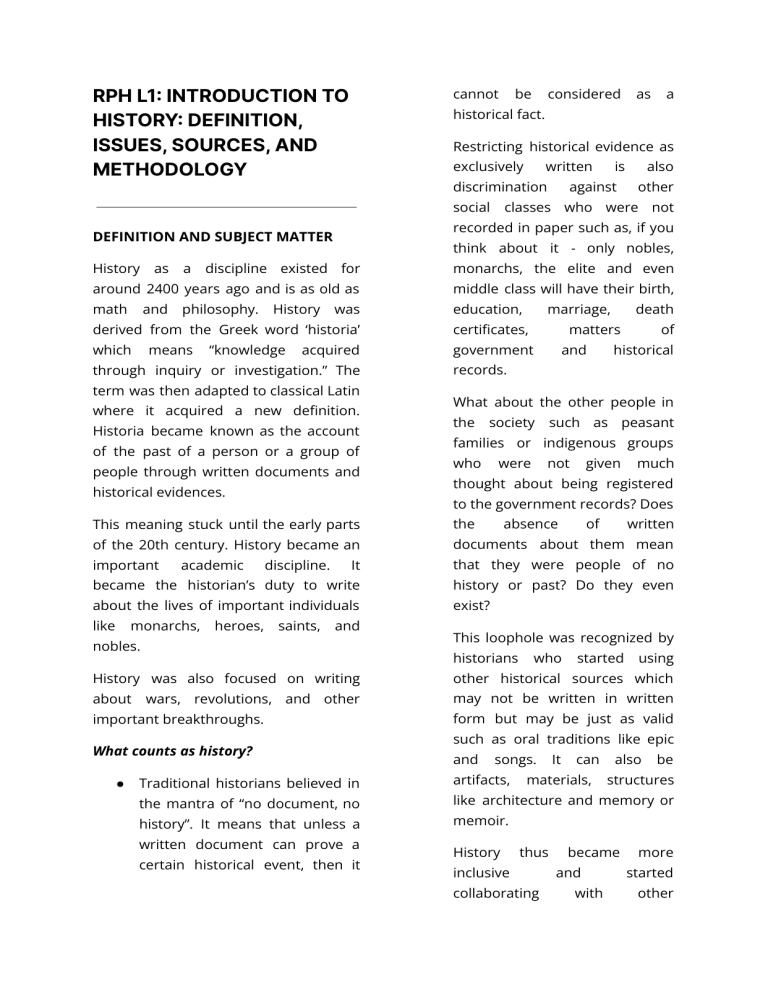
cannot RPH L1: INTRODUCTION TO HISTORY: DEFINITION, ISSUES, SOURCES, AND METHODOLOGY be considered as a historical fact. Restricting historical evidence as exclusively written discrimination social is against also other classes who were not recorded in paper such as, if you DEFINITION AND SUBJECT MATTER think about it - only nobles, discipline existed for monarchs, the elite and even around 2400 years ago and is as old as middle class will have their birth, math education, History as and a philosophy. History was marriage, derived from the Greek word ‘historia’ certificates, which government means “knowledge acquired through inquiry or investigation.” The term was then adapted to classical Latin where it acquired a new definition. Historia became known as the account of the past of a person or a group of people through written documents and historical evidences. death matters and of historical records. What about the other people in the society such as peasant families or indigenous groups who were not given much thought about being registered to the government records? Does This meaning stuck until the early parts the of the 20th century. History became an documents about them mean important It that they were people of no became the historian’s duty to write history or past? Do they even about the lives of important individuals exist? like academic monarchs, heroes, discipline. saints, and nobles. absence of written This loophole was recognized by historians who started using History was also focused on writing other historical sources which about may not be written in written wars, revolutions, and other important breakthroughs. What counts as history? ● Traditional historians believed in the mantra of “no document, no history”. It means that unless a written document can prove a certain historical event, then it form but may be just as valid such as oral traditions like epic and songs. artifacts, It can materials, also be structures like architecture and memory or memoir. History thus inclusive collaborating became and with more started other READINGS OF PHILIPPINE HISTORY (RPH) COMPILATION NOTES ● disciplines such as its auxiliary Differences disciplines. HISTORIOGRAPHY: Giving premium documents to written - essentially invalidated the history of other of HISTORY and History is the event or period and the study of it. - Historiography is the study of civilizations that do not keep how history was written, who written records. wrote Through time, history progressed it, and what factors influence how it was written. and opened up to the possibility It focuses on ‘history’ itself (how was a of valid historical sources, which certain historical text written? Who were written wrote it? What was the context of its documents. Some were keener publication? What particular historical on passing their history by word method was employed? What were the of mouth. Others were burned or sources used? not limited to destroyed by events of war or colonization. It gives us a better understanding of history; not only we get to learn Because of this, historians are historical facts, but also understanding now more inclusive and also of the facts and the historians contexts making (methods used, theory and perspective validation recognizing other and kinds of historical sources. Importance of Historiography: History as a discipline has already turned into a complex and dynamic inquiry. This dynamism that guided him will be analyzed.) inevitably produced various perspectives on the discipline regarding different questions such as: What is history? Why study history? And history is for whom? It is important for someone who studies history because it teaches the student to be critical in the lessons of history presented to him. History has played various roles in the past. States used history to unite a nation. It can be used as a tool to legitimize regimes and forge a sense of HISTORIOGRAPHY is the history of collective history. memory. Lessons from the past can be According to Oxford, it is the study of historical writing or the writing of history. identity through collective used to make sense of the present, learning of past mistakes can help people to not repeat them. POSITIVISM READINGS OF PHILIPPINE HISTORY (RPH) COMPILATION NOTES This school of thought emerged between the 18th - 19th century. This thought requires empirical and observable evidence before one can claim that a particular knowledge is true. powers created and taught their subjects. One of the problems confronted by history is the accusation that history is always written by victors. Similar to the positivist view - “no document, no Their mantra: “NO DOCUMENT, NO history”. HISTORY.” Positivism also entails an narrative of the past is always written objective from the bias of the powerful and the means of arriving at a conclusion. In the discipline of history, this mantra stems from the very same truth. Historians were required to show written primary documents in order to write a particular historical narrative. Positivist historians are expected to be objective and impartial not just in their argument but also on their conduct of historical research. POSTCOLONIALISM This connotes that more dominant. Comparison POSITIVISM POSTCOLONIALISM Between Early 20th century 18th - 19th century Mantra “no Tell the history of document, their nation; highlight no history” their identity free Emerged in the early 20th century from colonial when discourse and formerly colonized nations grappled with the idea of creating their identities and understanding their societies against the shadow of their colonial past. Looks at two things in writing history: 1. To tell the history of their nation that will highlight their identity free from that of colonial discourse and knowledge, and 2. To criticize the methods, effects, and idea of colonialism Postcolonial history is therefore a reaction and an alternative to the colonial history that colonial the knowledge Requires Criticize methods, empirical and effects, and idea of observable colonialism evidences Objective A reaction and an means of alternative to the arriving at a colonial history that conclusion colonial powers created and taught to their subjects THEIR SIMILARITY: School of Thought READINGS OF PHILIPPINE HISTORY (RPH) COMPILATION NOTES HISTORY AND THE HISTORIAN historians employ. It is not purely If history is written with agenda or is heavily influenced by the historian, is it subjective, there is still objectivity in that manner. possible to come up with an absolute Historical truth? certain An exact and accurate account of the past is impossible for the very simple reason that we cannot go back to the methodology techniques and comprises rules that historians follow in order to properly utilize resources and historical evidence in writing history. past. We cannot access the past directly Certain as our subject matter. conflicting accounts in different sources It is the historian’s job not just to see historical evidences and facts but also to interpret these facts. “Facts cannot speak for themselves.” rules apply in cases of as valid historical evidence. THE ANNALES SCHOOL OF HISTORY School of history born in France challenged the canons of history. This It is the job of the historian to give school of thought did away with the meaning to these facts and organize common historical subjects that were them into a timeline, establish causes, almost always related to the conduct of and write history. He is a person of his states and monarchs. Annales scholars own who is influenced by his own like Lucien. Febvre, Marc Bloch, Fernand context, environment, ideology, Braudel, and Jacques Le Goff studied education, and among other subjects in a historical manner. others. In that sense, his interpretation They were concerned with social history of the historical fact is affected by the and studied longer historical periods. influences, methodology that he will use, the facts that he shall select and deem relevant, his interpretation, and even the form of his writings. Thus, in one way or another, history is always subjective. Concerned with social history: For example: Annales scholars studied the history of peasantry, the history of medicine, or even the history of environment. The history from below If that is so, can history still be considered was pioneered by the same scholars. as an academic and scientific inquiry? They advocated that people and classes Yes, research who were not reflected in the history of requires rigor despite the fact that the society in the grand manner be historians cannot ascertain absolute provided with space in the records of objectivity, the study of history remains mankind. In doing this, Annales thinkers scientific married history with other disciplines because research historical because and of the rigor methodology of that READINGS OF PHILIPPINE HISTORY (RPH) COMPILATION NOTES like geography, anthropology, archaeology, and linguistics. The historian should be able to conduct HISTORICAL SOURCES an external and internal criticism of the With the past as history’s subject matter, the historian’s most important research Historical sources can be classified primary and secondary sources. The classification of sources between these two categories depends on the historical subject being studied. Primary sources are those sources produced at the same time as the event, period, or subject source, especially primary sources which can age in centuries. External criticism is the practice of tool are historical sources. between CRITICISMS being studied. Primary sources can include such as minutes of the convention, newspaper verifying the authenticity of evidence by examining its physical characteristics; consistency with the historical characteristics of the time when it was produced and the materials used for evidence. Examples of things that will be examined when conducting external criticism: quality of paper, type of ink, and language. clippings, documents, reports of the US * History is not only a discipline but also Commissioner, records of convention, a narrative: it extends to different fields draft, and disciplines. photographs of the event. Eyewitnesses if still alive can give their account of the convention such as delegates or those with tasks or organizers can be the memoirs of those who were present. We can also include archival memorabilia, documents, letters, artifacts, census, and government records, or novels. Internal criticism is the examination of the truthfulness of the evidence. It looks at the content of the source and examines the circumstance of its production. Internal criticism looks at the truthfulness and factuality of the evidence by looking at the author of the source, its context, the agenda behind Secondary sources are those sources, its which were produced by an author who informed it, and its intended purpose, used primary sources to produce the among others. material. In other words, secondary sources are historical sources which studied a certain historical subject. Both primary and secondary sources are useful history. in writing and learning creation, the knowledge which SCANDALOUS CASES OF DECEPTION IN THE PHILIPPINES 1. One of the most scandalous cases of deception in Philippine READINGS OF PHILIPPINE HISTORY (RPH) COMPILATION NOTES history is hoax Code of Kalantiaw. Sold to the National Library and was regarded as an important precolonial document until 1968, when the American historian William Henry Scott debunked the authenticity of the code due to anachronism and lack of evidence to prove. * anachronism is a chronological inconsistency in some arrangement, especially a juxtaposition of people, events, objects, language terms and costumes from different time periods. 2. Ferdinand Marcos also claimed that he was a decorated World War II soldier who led a guerilla unit called Ang Maharlika.
